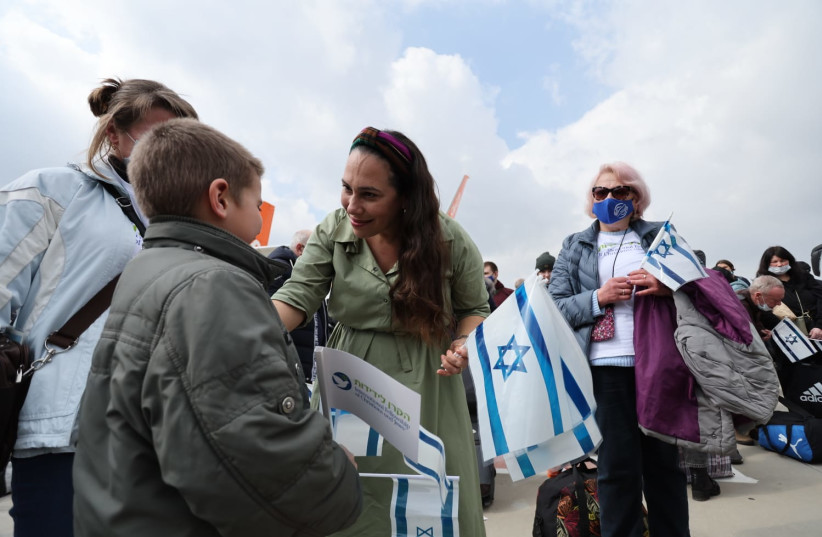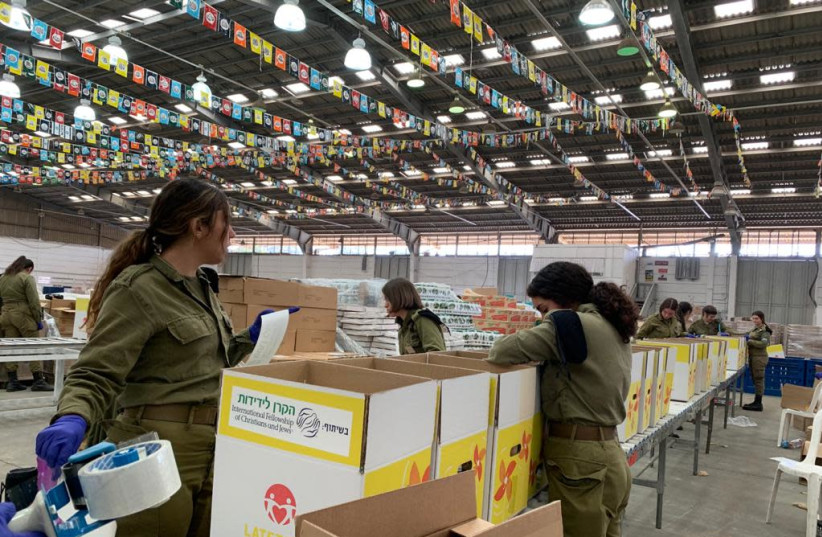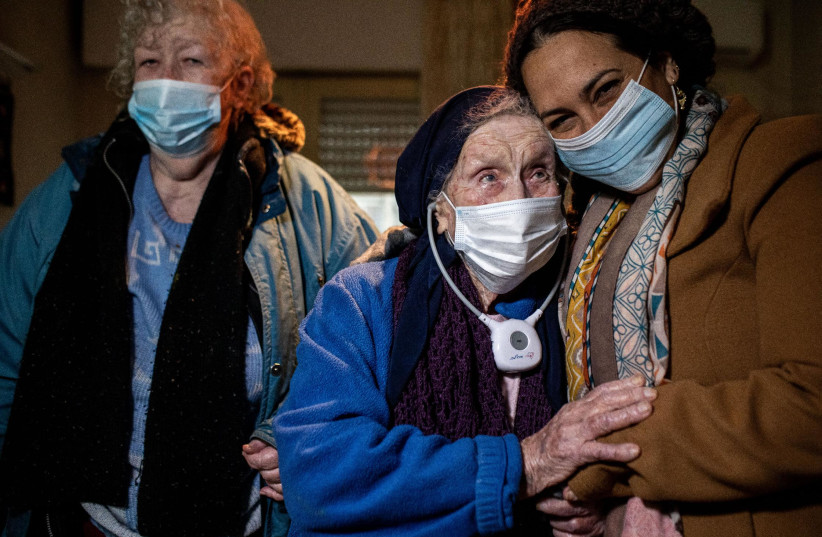“It is difficult to describe the world of Israeli philanthropy without the International Fellowship of Christians and Jews,” explained Nava Barak, president of ELEM Israel. “Even more so, it is difficult to imagine the worlds of the people in distress from all populations across the State of Israel without the support of The Fellowship’s extensive activities.”
Barak’s sentiments were echoed by every organization to which the Jerusalem Post reached out in recent days, trying to gauge the impact of The Fellowship – a non-profit organization originally founded to build bridges between Christians and Jews – on Israel. Today, The Fellowship is blessing the Jewish State and Jewish people around the world with humanitarian care and lifesaving aid at unprecedented levels.
The majority of funds are donated by Christians.
“Once you become a partner, you can do much more than by yourself. The Fellowship is an extraordinarily strong partner. I have learned that the moment I work with them, the service we can give to everyone is better,” said Shay Felber, Director of the Aliyah and Absorption Unit and Deputy Director General of the Jewish Agency for Israel.
The Jewish Agency, along with many other Israeli and Jewish organizations, worked closely with The Fellowship in recent months to help rescue and support Jewish and non-Jewish victims of the Ukraine war.

“Our collaboration with The Fellowship started many years ago, and because of this, when the war started, we were best positioned to help,” explained Shlomo Peles, a member of the Chabad of Ukraine leadership team.
Peles said that while many organizations around the world wanted to act, they were not equipped. Others came for a month or two but have already left the country. The Fellowship is still around.
“Our major partner was always The Fellowship. Now it is The Fellowship. And I know that even after the war, when the world has moved on, The Fellowship will still be here,” he said.
Peles recalled how Fellowship CEO Yael Eckstein herself got on a plane and went to Ukraine to see what was happening on the ground and how her organization could best help.
“People were fleeing Ukraine and she went there,” he said. “She did not believe she could just hear it from afar and make good decisions like that.
Among The Fellowship’s efforts with Chabad of Ukraine so far: Transporting more than 100 children from Ukraine to safety in neighboring countries in what was described as a military-style operation that beat all the odds. Many of them were from a Chabad orphanage in Odesa, though some were sent by their parents, who stayed behind.
In another remarkable move, The Fellowship distributed 10 tons of matzah for Passover to the Jewish community of Odesa.
The matzah delivery was planned before the Russian invasion of Ukraine, but was delayed due to the escalation. After an intensive collaborative effort by The Fellowship and Chabad, the matzah was released from the port and distributed.
“The Fellowship’s 30 years of working with Jews in need throughout the former Soviet Union has culminated in this moment,” Eckstein said. “This community is more vulnerable than it has been since World War II. The Fellowship has been there supplying their basic needs every day, and that includes during Passover and other Jewish holidays. We feel so blessed that even during this year filled with hardship and war, we were able to help them celebrate the holiday with dignity, and remind them that there is hope for a better future.”
The Jewish population of Ukraine prior to the war stood at about 200,000. Peles said that according to the latest data he received, as many as 70% of Jews remain; most of the elderly prefer to stay in place and some of the younger families who originally fled have returned. This is despite a report by the World Health Organization recently that said there is a food shortage in the country and scarce access to healthcare.
“We are trying to make sure no children go hungry,” Peles said.
‘Good people saving lives’

In another move, The Fellowship partnered with Magen David Adom to send ambulances to the Ukrainian borders to transport those in need of medical attention. MDA Director-General Eli Bin said that MDA understood that it needed to prepare the ambulances and send them over, but “we did not know how to make it happen. We would never have even had the money. But The Fellowship made it possible.”
And he said that was only one example. The Fellowship and MDA have been partnering for years, supporting the people of Israel in times of war and peace.
“The Fellowship is run by good people who are really saving lives,” Bin told the Post. “That is what we saw in Ukraine and that is what we see in Israel every time we work with The Fellowship.”
"At the heart of our two-plus decade partnership with The Fellowship is the value of pikuach nefesh, or urgently saving lives,” seconded Ariel Zwang, CEO of the American Jewish Joint Distribution Committee. “With the generous support of The Fellowship, JDC is providing daily care to tens of thousands of poor elderly Jews across the former Soviet Union. Our staff in the field are making heroic efforts to safeguard them during the current war – through emergency aid inside the country, evacuation services, and refugee support – and together, we put that value into action, serving as a lifeline.
"In my numerous visits to meet refugees and learn more about our response in countries bordering Ukraine, and in meeting with our teams working in Ukraine through our Hesed social service centers, I've witnessed an unending chain of care, connection, and community,” Zwang continued. “The power of our partnership with The Fellowship cannot be fully measured in headlines or dollars raised, but in lives saved and nourished, body and soul.
“That unique brand of compassion and urgent desire to help those in greatest need epitomizes Yael Eckstein's leadership and her unyielding sense of responsibility to her fellow Jews,” she continued. “It is what makes The Fellowship an outsized force for good in the Jewish world and speaks to the dedication of people of all faiths, including The Fellowship’s many Christian supporters, to bring blessings and care to Jews living in hopelessness and despair."
‘The Fellowship was our partner’

Take The Fellowship’s support of soldiers serving in the Israel Defense Forces. For more than 20 years, the organization has been supplying funds to Yahad – United for Israel's Soldiers, which go directly to the IDF and those who serve.
The Fellowship supports projects like providing apartments for lone soldiers (those who have no family in Israel or are estranged from their families) and developing a fund that helps soldiers from low socioeconomic backgrounds and their families buy needed furniture and electrical appliances. Yahad buys the items for them and coordinates their delivery directly to these families.
When the COVID-19 pandemic hit, The Fellowship began working with Latet to provide 1,500 seniors, mostly Holocaust survivors, with food and hygiene products.
“We needed to separate them from the community to reduce their chances of getting infected,” explained Eran Weintrob, CEO of Latet, the largest NGO combating poverty and food insecurity in Israel. “This was a very serious program, and The Fellowship was our partner.”
But the collaboration did not stop once the seniors were taken care of. As COVID dragged on, an increasing number of Israelis were left in poverty. Once again, The Fellowship stepped up, working with Latet to help combat growing food insecurity with food packages including fresh protein. Special stipends were also supplied for the holidays.

The Fellowship has likewise been partnering with ELEM since 2002, an organization that helps people suffering from substance abuse, neglect, bullying, and homelessness – especially young adults.
“I will never forget how Rabbi [Yechiel] Eckstein came to visit one of our day centers in Jerusalem and was sitting with the young people and listening to their stories,” recalled ELEM’s Barak. “He raised so many important questions: Why do they not have a place to sleep in the center? Why shouldn’t young people who have run away from home not receive significant support?
“Fortunately, the answer to his questions eventually came true,” Barak continued. “With the help of The Fellowship and the Welfare Ministry, the day centers have been converted into shelters in which these young men and women can stay throughout the night.”
The shelter accommodates young adults between the ages of 18-26, and provides them with donated clothing, a place to do their laundry, and a hot shower. There is a stocked kitchen with hot meals, coffee, and snacks. At the same time, the shelter offers a therapeutic environment, including ELEM social workers and mental health professionals aimed at supplying them with the support they need to eventually get them off the streets and make them self-sufficient.
‘Wherever we need them to be, The Fellowship is there’
Among the more striking aspects of The Fellowship’s efforts in Israel is that it is funded almost entirely by Christian Zionists, people who believe in the Bible, love the Jewish people and Israel, and feel compelled to give.
“The fact that you have Christians supporting Israel is highly important,” said the Jewish Agency’s Felber. “We don’t have many friends around the world. We don’t only benefit from these Christians’ financial support, but from their care for Israel. It shows us we are not alone and for me, as an Israeli, it warms my heart and gives me hope.”
“I think that human hardships, as well as human generosity, are matters that go beyond religion, nationality, skin color, gender, and economic status,” Barak added.
She described Eckstein as “inspiring.”
“Yael mobilized with all her might after the sudden death of the late Rabbi Eckstein, to continue to carry the torch and step into her father's great shoes,” Barak said. “Today she manages to touch hearts and raise donations all over the world and continue the glorious legacy of The Fellowship.”
She said The Fellowship has its finger on the pulse when it comes to the needs of Israeli society. When missiles were fired at communities in the north and south, The Fellowship came out to renovate houses and shelters and provide supplies. It mobilized for the absorption of immigrants in all the waves of immigration that came to Israel, and even today, The Fellowship is rescuing Ukrainian refugees from the battle zone.
“We always know in a time of need that we have someone to turn to,” Barak said.
Added MDA’s Bin: “Wherever we need them to be, The Fellowship is there.”
This article was written in cooperation with the International Fellowship of Christians and Jews.
